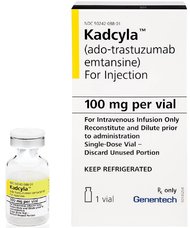
FDA Approves New Drug for Breast Cancer
-
About 20 percent of breast cancers have an increase in the amount of a protein called HER2.
HER2 is a protein involved in normal cell growth. It is found in increased amounts on some types of cancer cells (HER2-positive), including some breast cancers. In these HER2-positive breast cancers, the increased amount of the HER2 protein contributes to cancer cell growth and survival.
Kadcyla, also referred to as T-DM1, is a new drug that was approved by the Food and Drug Administration (FDA) on February 22, 2013, intended for patients who were previously treated with trastuzumab (also known as Herceptin), another anti-HER2 therapy, and taxanes, a class of chemotherapy drugs commonly used for the treatment of breast cancer. (Read full article in the New York Times).
“Kadcyla is trastuzumab connected to a drug called DM1 that interferes with cancer cell growth,” said Richard Pazdur, MD, director of the Office of Hematology and Oncology Products in the FDA’s Center for Drug Evaluation and Research. “Kadcyla delivers the drug to the cancer site to shrink the tumor, slow disease progression and prolong survival. It is the fourth approved drug that targets the HER2 protein.” Other FDA-approved drugs used to treat HER2-positive breast cancer include trastuzumab (Herceptin – 1998), lapatinib (Tykerb – 2007) and pertuzumab (Perjeta – 2012).
Results of a randomized clinical trial comparing Kadcyla to lapatinib plus capecitabine showed that patients treated with Kadcyla had a 5 month longer survival. The most common side effects reported in patients treated with Kadcyla were nausea, fatigue, pain in the muscles or joints, low levels of platelets in the blood (thrombocytopenia), increased levels of liver enzymes, headache, and constipation. There are other serious but rare side effects that should be discussed by the treating oncologist.
This is another important advance in the treatment of patients who have advanced breast cancers that are HER2 positive. Kadcyla (T-DM1) is also being investigated in early stage breast cancer.
For more information, here is a link to the abstract published in the New England Journal of Medicine on October 1, 2012 (Trastuzumab Emtansine for HER2-Positive Advanced Breast Cancer).
